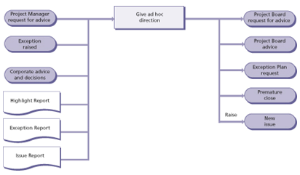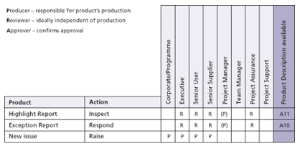PRINCE2 2009 - Directing a project part 8
of the Cabinet Office under delegated authority from the Controller of HMSO.
Activities
Give ad hoc direction
Project Board members may offer informal guidance or respond to requests for advice at any time during a project.
The need for consultation between the Project Manager and Project Board is likely to be particularly frequent during the initiation stage and when approaching stage boundaries.
Ad hoc direction may be given collectively or by individual Project Board members.
There are a variety of circumstances that might prompt ad hoc direction, including:
- Responding to requests (e.g. when options need clarifying or where areas of conflict need resolving)
- Responding to reports (e.g. Highlight Report, Exception Report, Issue Report)
- Responding to external influences (e.g. changes in corporate priorities)
- Project Board members’ individual concerns
- Responding to changes in Project Board composition (which may also require corporate or programme approval)
It is also possible that corporate or programme management revises the project mandate in response to events external to the project, or instructs the Project Board to close the project. The Project Board has two primary options should corporate or programme management decide to change the project mandate:
- Treat it as a request for change (see the section covering ‘Change’) – asking the Project Manager to replan the stage and/or project
- Stop, and restart the project by triggering premature closure (see the section covering ‘Closing a Project’). This may result in additional costs compared to the request-for-change option.
The Project Board may appoint Project Assurance to undertake some of the reviewing and assessing actions (e.g. inspecting a request for change to confirm that adequate impact assessment has been undertaken). When making decisions, it is important to consider the impact on all stakeholders (as identified in the Communication Management Strategy).
Diagram 1 shows the inputs to, and outputs from, this activity.
Diagram 1
PRINCE2® recommends the following actions:
- In response to informal requests for advice and guidance:
- Seek advice from corporate or programme management if necessary
- Assist the Project Manager as required (this may include asking the Project Manager to produce an Issue Report and/or an Exception Report)
- In response to an escalated Issue Report (see the section covering ‘Change’):
- Seek advice from corporate or programme management if necessary
- Make a decision within the Project Board’s delegated limits of authority. This decision could be regarding:
- A problem/concern
- Ask for an Exception Plan or provide guidance
- A request for change
- Approve, defer, reject or ask for more information. Consider whether an Exception Plan is required
- An off-specification
- Grant a concession, defer, reject or ask for more information. Consider whether an Exception Report is required
- In response to an Exception Report (see the section covering ‘Progress’):
- Seek advice from corporate or programme management if necessary
- Make a decision, within the Project Board’s delegated limits of authority, to:
- Increase the tolerances that are forecast to be breached
- Instruct the Project Manager to produce an Exception Plan (stating what will be acceptable)
- Instruct the Project Manager to close the project prematurely
- Defer the exception for a fixed period of time. This is a useful response if there is low confidence in the forecast (that tolerances will be exceeded) or if the exception is contingent on a risk occurring
- In response to the receipt of a Highlight Report (see the section covering ‘Progress’):
- Review the Highlight Report to understand the status of the project
- Ensure that the project remains focused on the corporate or programme objectives set, and remains justified in accordance with its Business Case
- Ensure that the stage is progressing according to plan
- Keep corporate or programme management and other interested parties informed about project progress, as defined by the Communication Management Strategy
- Take actions as necessary. For example, ask the Project Manager to produce an Issue Report and/or an Exception Report
- In response to advice and decisions from corporate or programme management:
- Ensure that the project management team is kept informed of external events that may affect it (for example, advising the Project Manager of a change of Project Board personnel)
- Notify the Project Manager of any changes in the corporate or programme environment that may impact on the project, and ensure appropriate action is taken. This may involve:
- Raising an issue to the Project Manager
- Instructing the Project Manager to produce an Exception Plan
- Instructing the Project Manager to close the project prematurely
Diagram 2 shows the responsibilities for this activity.
Diagram 2
PRINCE2® is a Registered Trade Mark of the Office of Government Commerce in the United Kingdom and other countries.
Managing Successful Projects with PRINCE2 - 2005 edition
Managing successful Projects with PRINCE2 – 2009 edition
Directing Projects with PRINCE2.
plus:
The Complete Project Management package.
And much more besides - at a fantastic price.





